Mostrar el registro sencillo del ítem
dc.contributor.author
Obara, Isaiah
dc.contributor.author
Nielsen, Morten

dc.contributor.author
Jeschek, Marie
dc.contributor.author
Nijhof, Ard
dc.contributor.author
Mazzoni, Camila J.
dc.contributor.author
Svitek, Nicholas

dc.contributor.author
Steinaa, Lucilla

dc.contributor.author
Awino, Elias

dc.contributor.author
Olds, Cassandra
dc.contributor.author
Jabbar, Ahmed
dc.contributor.author
Clausen, Peter Henning
dc.contributor.author
Bishop, Richard P.
dc.date.available
2018-07-06T15:52:43Z
dc.date.issued
2016-05
dc.identifier.citation
Obara, Isaiah; Nielsen, Morten; Jeschek, Marie; Nijhof, Ard; Mazzoni, Camila J.; et al.; Sequence diversity between class I MHC loci of African native and introduced Bos taurus cattle in Theileria parva endemic regions: in silico peptide binding prediction identifies distinct functional clusters; Springer; Immunogenetics; 68; 5; 5-2016; 339-352
dc.identifier.issn
0093-7711
dc.identifier.uri
http://hdl.handle.net/11336/51498
dc.description.abstract
There is strong evidence that the immunity induced by live vaccination for control of the protozoan parasite Theileria parva is mediated by class I MHC-restricted CD8+ T cells directed against the schizont stage of the parasite that infects bovine lymphocytes. The functional competency of class I MHC genes is dependent on the presence of codons specifying certain critical amino acid residues that line the peptide binding groove. Compared with European Bos taurus in which class I MHC allelic polymorphisms have been examined extensively, published data on class I MHC transcripts in African taurines in T. parva endemic areas is very limited. We utilized the multiplexing capabilities of 454 pyrosequencing to make an initial assessment of class I MHC allelic diversity in a population of Ankole cattle. We also typed a population of exotic Holstein cattle from an African ranch for class I MHC and investigated the extent, if any, that their peptide-binding motifs overlapped with those of Ankole cattle. We report the identification of 18 novel allelic sequences in Ankole cattle and provide evidence of positive selection for sequence diversity, including in residues that predominantly interact with peptides. In silico functional analysis resulted in peptide binding specificities that were largely distinct between the two breeds. We also demonstrate that CD8+ T cells derived from Ankole cattle that are seropositive for T. parva do not recognize vaccine candidate antigens originally identified in Holstein and Boran (Bos indicus) cattle breeds.
dc.format
application/pdf
dc.language.iso
eng
dc.publisher
Springer

dc.rights
info:eu-repo/semantics/openAccess
dc.rights.uri
https://creativecommons.org/licenses/by-nc-sa/2.5/ar/
dc.subject
Ankole Cattle
dc.subject
Cd8+ T Cell Epitopes
dc.subject
Class I Mhc
dc.subject
Pyrosequencing
dc.subject
Theileria Parva
dc.subject.classification
Ingeniería Médica

dc.subject.classification
Ingeniería Médica

dc.subject.classification
INGENIERÍAS Y TECNOLOGÍAS

dc.subject.classification
Otras Biotecnologías de la Salud

dc.subject.classification
Biotecnología de la Salud

dc.subject.classification
CIENCIAS MÉDICAS Y DE LA SALUD

dc.title
Sequence diversity between class I MHC loci of African native and introduced Bos taurus cattle in Theileria parva endemic regions: in silico peptide binding prediction identifies distinct functional clusters
dc.type
info:eu-repo/semantics/article
dc.type
info:ar-repo/semantics/artículo
dc.type
info:eu-repo/semantics/publishedVersion
dc.date.updated
2018-06-19T16:52:40Z
dc.journal.volume
68
dc.journal.number
5
dc.journal.pagination
339-352
dc.journal.pais
Alemania

dc.journal.ciudad
Berlin
dc.description.fil
Fil: Obara, Isaiah. Freie Universität Berlin; Alemania
dc.description.fil
Fil: Nielsen, Morten. Technical University of Denmark; Dinamarca. Consejo Nacional de Investigaciones Científicas y Técnicas. Centro Científico Tecnológico Conicet - La Plata. Instituto de Investigaciones Biotecnológicas. Instituto de Investigaciones Biotecnológicas "Dr. Raúl Alfonsín" (sede Chascomús). Universidad Nacional de San Martín. Instituto de Investigaciones Biotecnológicas. Instituto de Investigaciones Biotecnológicas "Dr. Raúl Alfonsín" (sede Chascomús); Argentina
dc.description.fil
Fil: Jeschek, Marie. Berlin Center for Genomics in Biodiversity Research; Alemania
dc.description.fil
Fil: Nijhof, Ard. Freie Universität Berlin; Alemania
dc.description.fil
Fil: Mazzoni, Camila J.. Berlin Center for Genomics in Biodiversity Research; Alemania. Evolutionary Genetics; Alemania
dc.description.fil
Fil: Svitek, Nicholas. International Livestock Research Institute; Kenia
dc.description.fil
Fil: Steinaa, Lucilla. International Livestock Research Institute; Kenia
dc.description.fil
Fil: Awino, Elias. International Livestock Research Institute; Kenia
dc.description.fil
Fil: Olds, Cassandra. International Livestock Research Institute; Kenia
dc.description.fil
Fil: Jabbar, Ahmed. Freie Universität Berlin; Alemania
dc.description.fil
Fil: Clausen, Peter Henning. Freie Universität Berlin; Alemania
dc.description.fil
Fil: Bishop, Richard P.. International Livestock Research Institute; Kenia
dc.journal.title
Immunogenetics

dc.relation.alternativeid
info:eu-repo/semantics/altIdentifier/doi/https://dx.doi.org/10.1007/s00251-016-0902-5
dc.relation.alternativeid
info:eu-repo/semantics/altIdentifier/url/https://link.springer.com/article/10.1007%2Fs00251-016-0902-5
Archivos asociados
